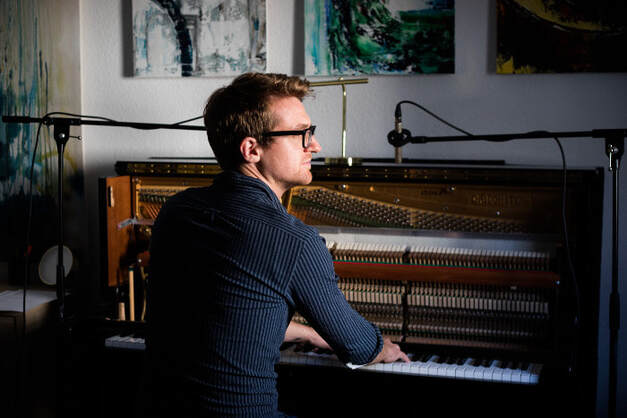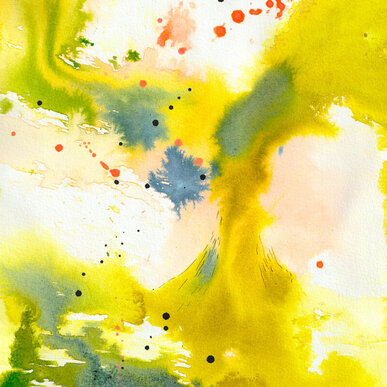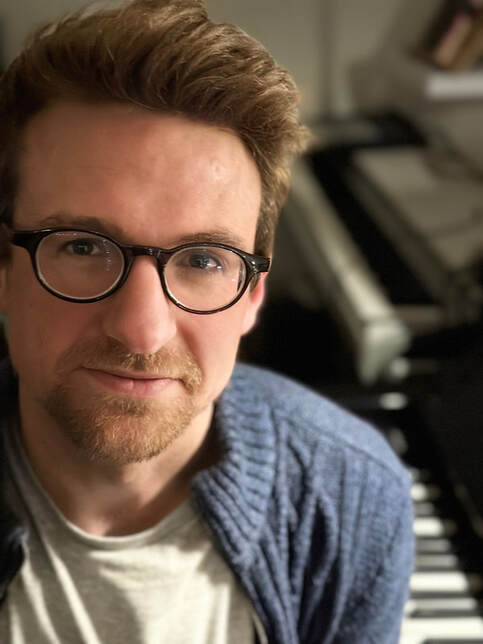Klanglandschaften
The new EP 'Being' by Frankfurt composer Garreth Brooke will be released at the end of July. For many years he has been dealing with the topic of grief and how music can counteract it. With the album "Healing" he had great success and his music is streamed millions of times. It's time to introduce the musician a little more closely with this interview.
 Garreth Brooke from England currently lives in Frankfurt.(Photo: Lana Yanovska)
Garreth Brooke from England currently lives in Frankfurt.(Photo: Lana Yanovska)
Hello Garreth, how are you right now?
I’m very well thank you. I’m currently in the UK attending a residential piano course called the Thinking Pianist, which I’m really enjoying. It’s great to spend lots of time with such an interesting bunch of pianists and I’ve learnt a lot.
You have been living in Frankfurt for some time. How is the German language progressing?
It’s coming along pretty well, thank you! In Frankfurt you can get away with speaking English quite a lot but I really enjoy learning German so I work at it every day. I actually find that I often want to use a particular German word when I’m speaking in English, because some German words express things so perfectly. My favourite example at the moment is “auseinandersetzen”: there’s no English translation that does justice to this wonderful verb!
With the album "Healing" and the collaboration with Anna Salzmann you wrote a real success. Were you surprised by the very positive reviews back then?
I was really pleased with how it was received, but I think it speaks to the fact that the music explores a difficult topic in a very honest and open way, and that we need more music like that. There is an extraordinary amount of music being created and released at the moment, but only a fraction of it really has much depth. There’s a place for music without much depth—indeed I’ve written quite a bit of shallow myself—but sometimes we really do have to confront harder, more complex issues.
It has been scientifically proven that music has a healing effect. How exactly do you go about composing these special pieces?
For Healing my partner Anna Salzmann (@annasalzmannartist) painted 11 abstract paintings in which she explored what it means to heal. I then took each painting, one at a time, set it on the piano, studied it, and thought about the response it provoked in me, then improvised a piece based on that response. Gradually I started to realise how the pieces could fit together into one long narrative, which is the order in which they’re presented in the album. It opens with some very dark material, moves through lighter passages before the darkness rears its head again, but in the final duo of pieces the darkness is overcome.
However, music can also trigger painful memories - how do you prevent the listener from being confronted with this?
I actually believe one of our jobs as artists is to create a space where people can choose to explore their more painful memories. I know when I’ve had a successful concert when I see that members of the audience are crying. That sounds terribly cynical when I put it like that, but what I mean is that I have successfully created a space where people can allow some of their repressed emotion to be safely released. The people who have cried frequently come to talk to me afterwards and the conversations that we have have been unspeakably profound; we share a great deal and it gives us both a new resilience to deal with the world. It’s a wonderful experience, one of the most transformative things I do and terribly important to me.
I’m very well thank you. I’m currently in the UK attending a residential piano course called the Thinking Pianist, which I’m really enjoying. It’s great to spend lots of time with such an interesting bunch of pianists and I’ve learnt a lot.
You have been living in Frankfurt for some time. How is the German language progressing?
It’s coming along pretty well, thank you! In Frankfurt you can get away with speaking English quite a lot but I really enjoy learning German so I work at it every day. I actually find that I often want to use a particular German word when I’m speaking in English, because some German words express things so perfectly. My favourite example at the moment is “auseinandersetzen”: there’s no English translation that does justice to this wonderful verb!
With the album "Healing" and the collaboration with Anna Salzmann you wrote a real success. Were you surprised by the very positive reviews back then?
I was really pleased with how it was received, but I think it speaks to the fact that the music explores a difficult topic in a very honest and open way, and that we need more music like that. There is an extraordinary amount of music being created and released at the moment, but only a fraction of it really has much depth. There’s a place for music without much depth—indeed I’ve written quite a bit of shallow myself—but sometimes we really do have to confront harder, more complex issues.
It has been scientifically proven that music has a healing effect. How exactly do you go about composing these special pieces?
For Healing my partner Anna Salzmann (@annasalzmannartist) painted 11 abstract paintings in which she explored what it means to heal. I then took each painting, one at a time, set it on the piano, studied it, and thought about the response it provoked in me, then improvised a piece based on that response. Gradually I started to realise how the pieces could fit together into one long narrative, which is the order in which they’re presented in the album. It opens with some very dark material, moves through lighter passages before the darkness rears its head again, but in the final duo of pieces the darkness is overcome.
However, music can also trigger painful memories - how do you prevent the listener from being confronted with this?
I actually believe one of our jobs as artists is to create a space where people can choose to explore their more painful memories. I know when I’ve had a successful concert when I see that members of the audience are crying. That sounds terribly cynical when I put it like that, but what I mean is that I have successfully created a space where people can allow some of their repressed emotion to be safely released. The people who have cried frequently come to talk to me afterwards and the conversations that we have have been unspeakably profound; we share a great deal and it gives us both a new resilience to deal with the world. It’s a wonderful experience, one of the most transformative things I do and terribly important to me.
You can do almost anything with a piano
 The new EP will be released on July 28, 2023,
The new EP will be released on July 28, 2023,
Before we get to the new EP, tell us a bit about yourself - how did you get into music?
When I was small my Mum played a little piano and enrolled me for piano lessons. I really enjoyed them, I had a wonderful piano teacher called Mr Clifford. When my Mum began suffering with depression and then attempted suicide, my music teacher Mr Wilson allowed me to skip lessons and go play on the piano in the practise room whenever I wanted. This kindness gave me a safe space where I could express the complex emotions I was feeling, and since then the piano is the place I go to for help.
The new EP "Being", which will be released at the end of July, acoustically describes moments from a perfect day. How did you put the pieces together or what events led to it?
I’ve understandably got a bit of reputation amongst my friends for writing music for crying, and I’ve been reflecting on that and recently I’ve been cultivating my more positive side. I’m actually an optimist, despite everything that’s happened, and sometimes it’s wonderful to let that side of myself out. The pieces on the Being EP came together over the course of about two years, while I was putting together tracks for a potential album. The tracks don’t fit the album but they do clearly belong together. After listening to them a lot I realised that they depicted this perfect summers’ day.
Which track on the album challenged you the most until you were completely satisfied?
Honestly, this EP was a breeze to write, I really enjoyed every moment. The music just came to me. I wish every album was so easy!
The EP contains a total of 4 tracks full of fragile beauty and melancholy. Is there a piece that is very close to your heart?
That’s a little like asking a parent which child is their favourite! No, I have no favourites. They each have their place, and they belong together. I will tell you a story about “Waking”, though. It’s the final track of the album and I improvised it early one morning while drinking my first coffee at around 5:30am, and the opening four note melody is the cheerful tune our kettle makes when you turn it on. It’s a perfectly peaceful track, and I love that it captures that moment so well.
The piano is always a protagonist in your works. What makes this instrument so special for you?
I really don’t think it is an exaggeration to say the piano is the best instrument of all. You can do almost anything with a piano. I mentioned earlier that I’m at a course for pianists and just today I’ve heard music evoking all emotions. Even the cheapest, most beaten-up second-hand piano often has a unique beauty.
I am a firm believer that people who persistently release good music
 Garreth's music has been streamed over 10 million time.
Garreth's music has been streamed over 10 million time.
What does a Garreth Brooke do when he's not at the piano or in the studio?
I love to cycle, hang out with my partner Anna and walk our little dog Molly.
Do you follow the releases in your music field? Which album or composer made a big impression on you recently? Yes, I do: most recently Fiona Rutherford really grabbed my attention. I write album reviews for A Closer Listen, you can read more about Fiona and my other favourites there.
You're also a teacher - What advice would you give to young people who are talented and love to compose music but don't dare release their music because they think it's bad or nobody cares?
I really don’t like to give advice; there’s too much bad advice out there already. I’d much rather have a conversation with them that begins with the question: „why do you want to release it?“ If they are doing it for the right reasons—because they love it, or because they have something profound to share—then I would advise them go ahead, regardless of their fears about what people think. I am a firm believer that people who persistently release good music for the right reasons will eventually find the audience they want.
Do you remember the very first song you wrote? Describe it a little.
I don’t, but that’s probably a good thing! It was probably something based on The Snowman by Howard Blake; that was the first piece that my piano teacher used as a basis for improvising.
When and how did you discover the genre of classical music for yourself?
Studying classical piano was a big part of the piano lessons when I was growing up, so it’s always been around me. However, I was largely unaware of the contemporary classical scene until I joined Soundcloud and got to know composers like Tom Blankenberg, Simeon Walker and Nathan Shubert. That was a major turning point for me!
Thank you Garreth for your time. The last words are yours:
Thank you for taking the time to create Gezeitenstrom, which is a wonderful resource for music fans!
The interview was conducted by André Schönauer
Links zu Garreth Brooke:
|
EP 'Being' on Bandcamp:
|
